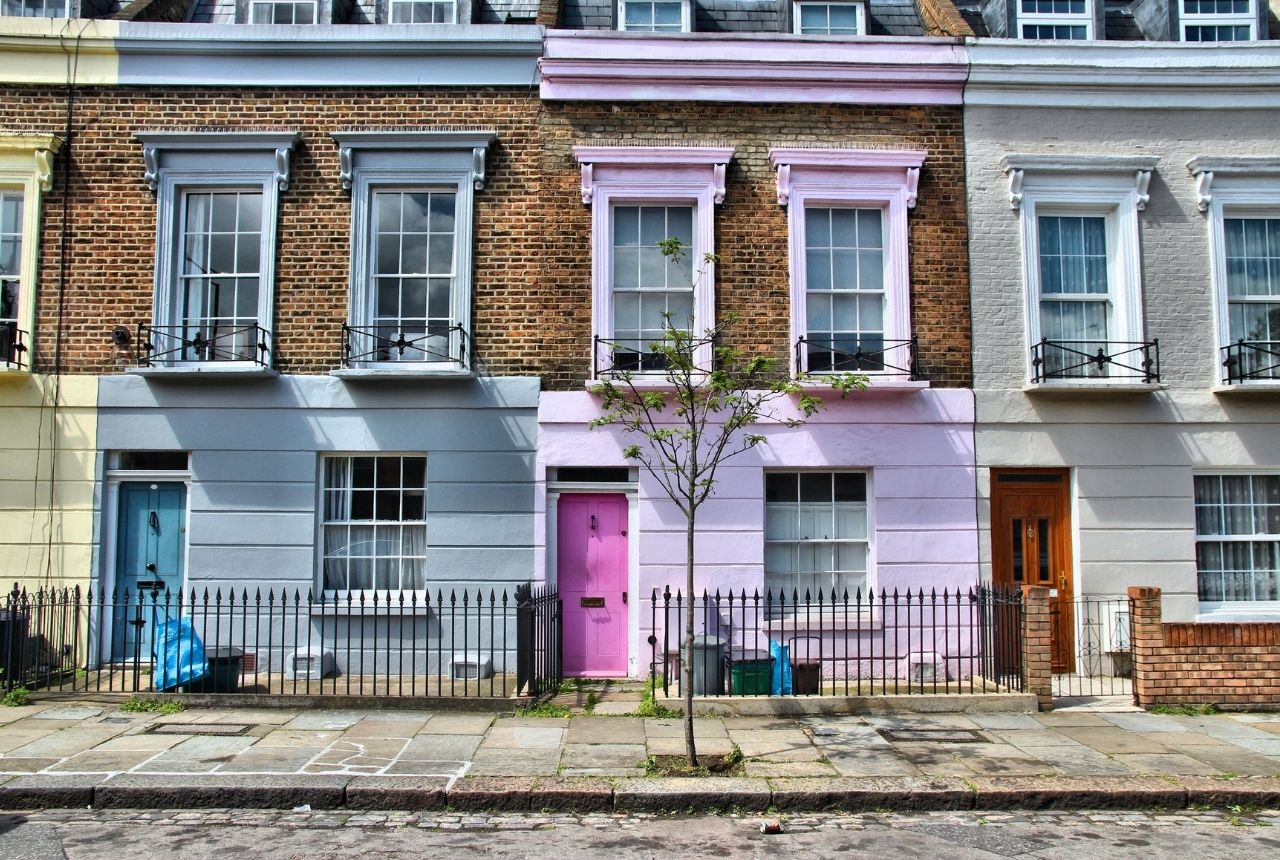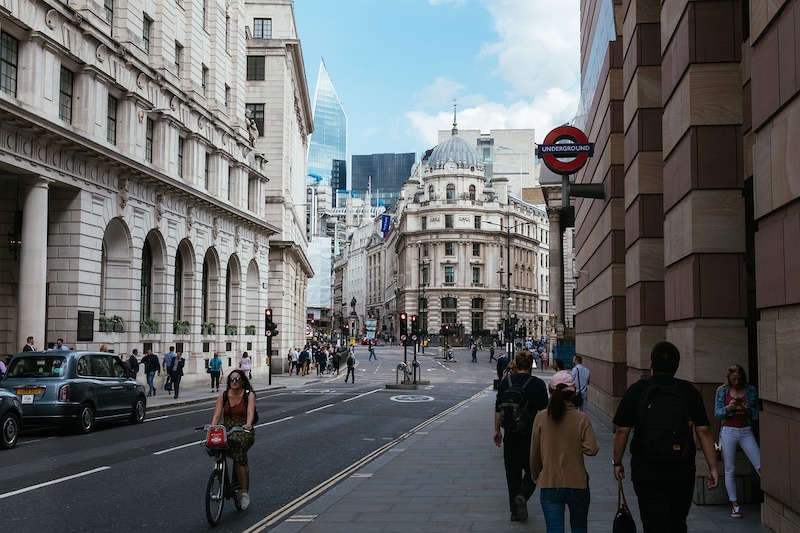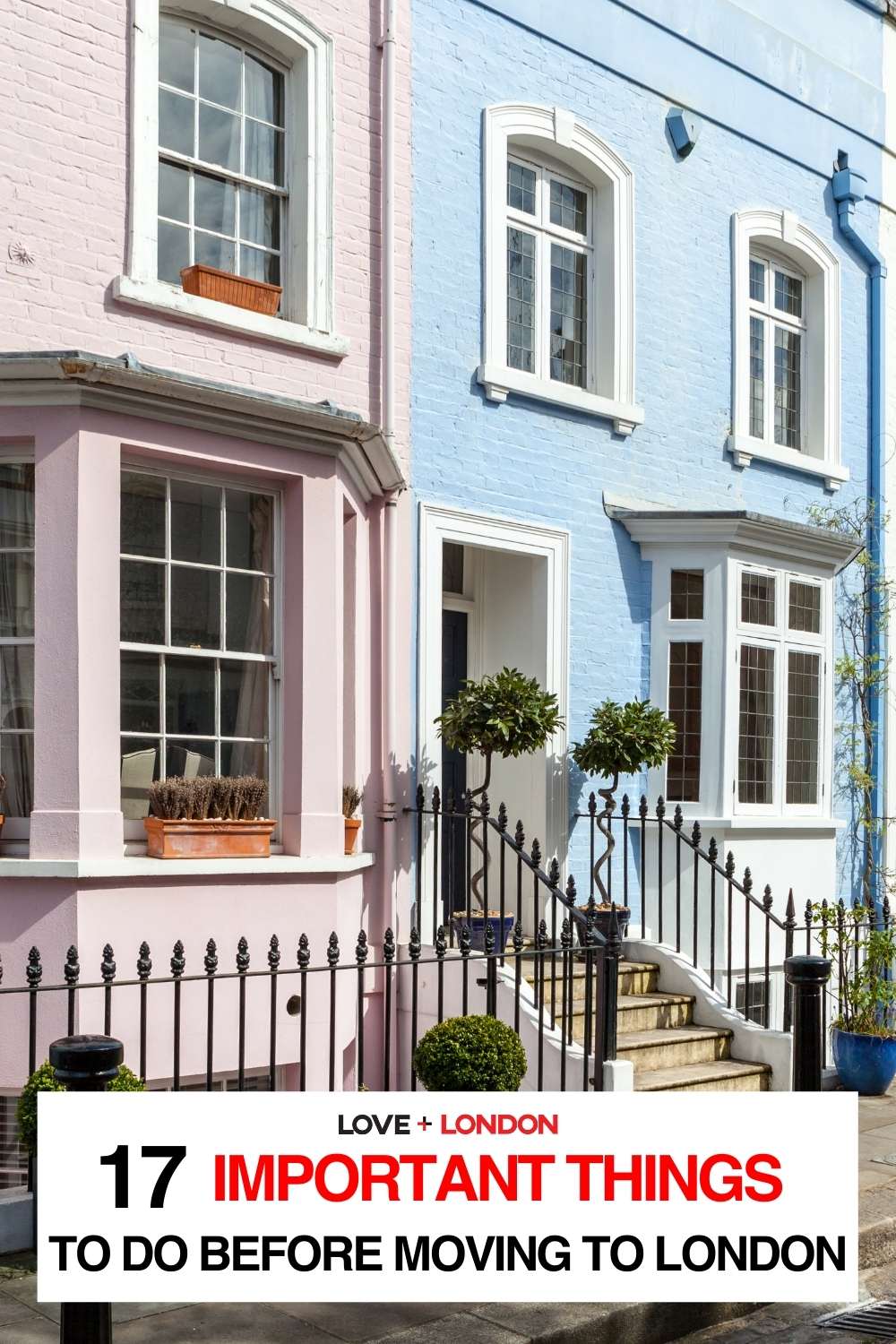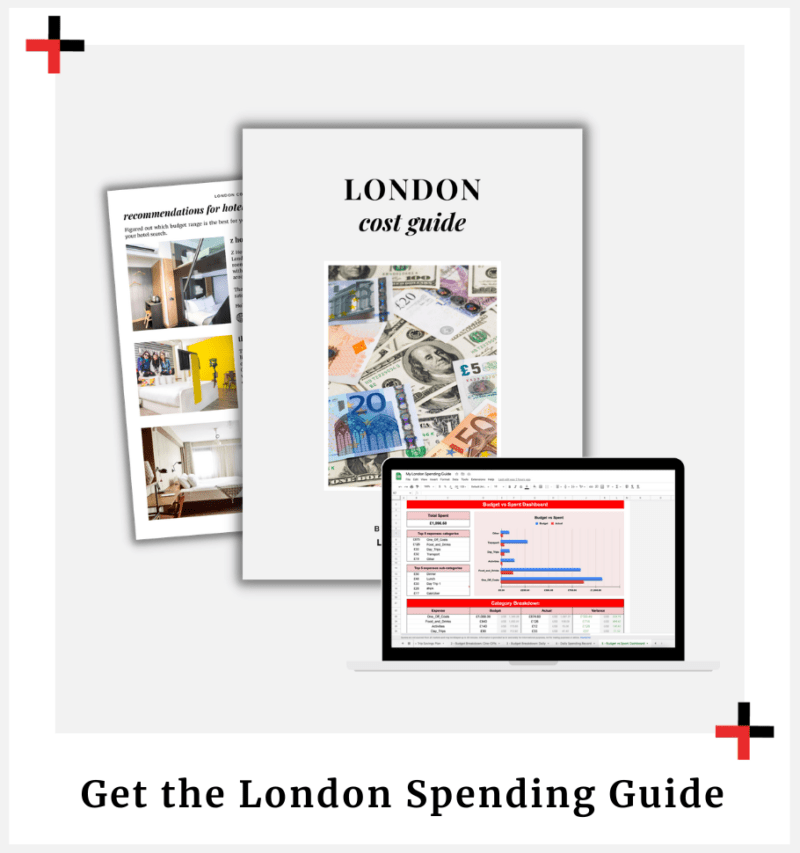So, you’re moving to London from abroad? Big step, but very cool. As an American who moved to London many years ago, I welcome you to this amazing city… soon! I also moved to Italy way back when, so I’ve gone through the process of moving to a foreign country a couple of times, so in this article I’m sharing with you the most important things to do before moving to London.
Complete these tasks before you get here and you’ll have less stressful experience, and maybe even save yourself some money.
Let’s start with things to do a few months out, and then I’ll tell you what you should be doing just a few days before you arrive in London to start your new, exciting life.
Finally, if you prefer to watch instead of read, here is the video version of this article.
Important things to do before moving to London: a few months out
Calculate your moving costs
Depending on your situation and your expected standard of living when you move to London, your actual move to London might end up requiring quite a bit of cash upfront for various items and services.
So to be extra prepared, you’ll want to know how much these costs will be so you can have cash ready and waiting in your savings account for when you need it.
I have a very thorough video in which I talk about all of the moving costs to think about when moving to London from another country, so watch it (below) for help with your own calculations and planning.
https://www.youtube.com/watch?v=HRoIGe-hh7w
Create your “moving costs” savings pot
With the your goal savings number you’ve just calculated in mind, create a savings pot of cash stashed in one of your bank accounts that you will contribute to until you reach your goal amount. Once you’ve reached your savings goal, don’t touch that pot until it’s time to go to London or a moving-related expense comes up.
Calculate potential salary and monthly living costs
Making an excel spreadsheet (my fave) of your estimated incomings and outgoings of your life in London will help you visualise your London life and what you can expect based on your potential cash flow.
In your budget spreadsheet you will be able to quickly and easily calculate things like how much discretionary money you’ll have left over for travel and other fun stuff, if you should rent on your own vs renting a room in a house share, and more.
Your starting point for this is salary. If you don’t have a job yet and don’t know what kind of salary you can expect, try Glassdoor to find a range for your industry and level, and also search on sites like Indeed and LinkedIn Jobs to see what salaries are being listed for roles that you would be interested in.
Once you’ve got an idea of salary, calculate how much you can realistically spend on rent (the biggest expense, always!) bills, groceries, etc. This number will likely fluctuate once you do the next step, and that’s ok. That’s why we use a spreadsheet, for easy changes and calculations!
Research possible areas to live
With a roundabout idea of how much money you can spend on rent, start to do your research on which areas appeal to you to live in. Do you want to live in Central London, with the hustle and bustle and where you’ll get much less for your money? Or would you prefer further out of the centre, perhaps in a quiet greener area like Wimbledon where you’ll get a bit more for your cash? Do you want to be living near banker-heavy areas like City, or where artists and creatives tend to hang out, like Camden or Hackney Wick?
If you have literally no idea anything about any of London’s areas, I have two tools to help.
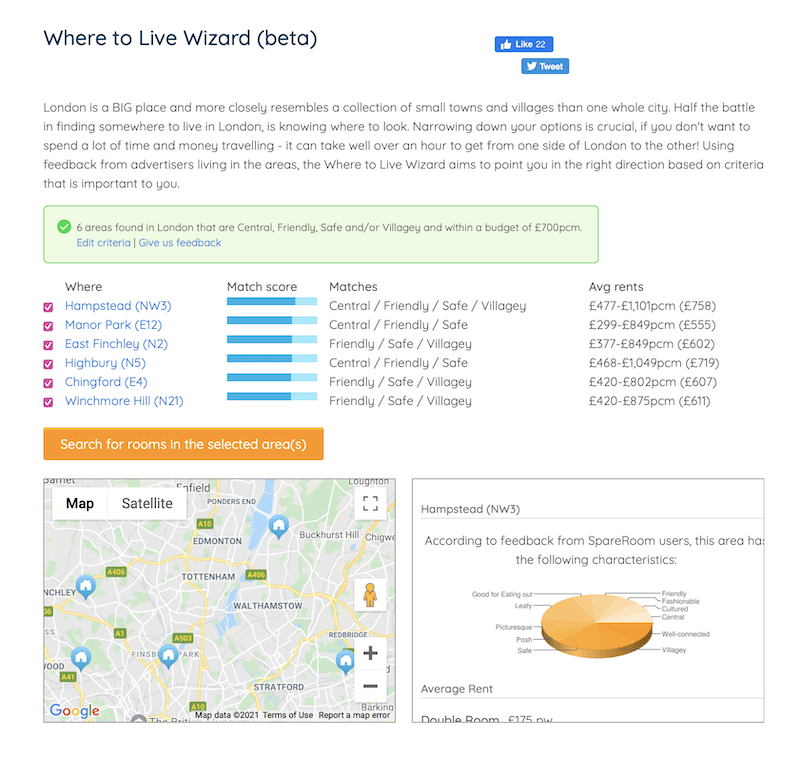
Start with the Where to Live Wizard from SpareRoom. You use this tool to check off which “characteristics” you want in an area and what your budget is, and then it spits out some recommendations for you with some info on the average room rental costs.
Even if you’re looking for your own place, this is a good too to start you off with your research and to get an idea of relative costs and the vibes of certain areas.
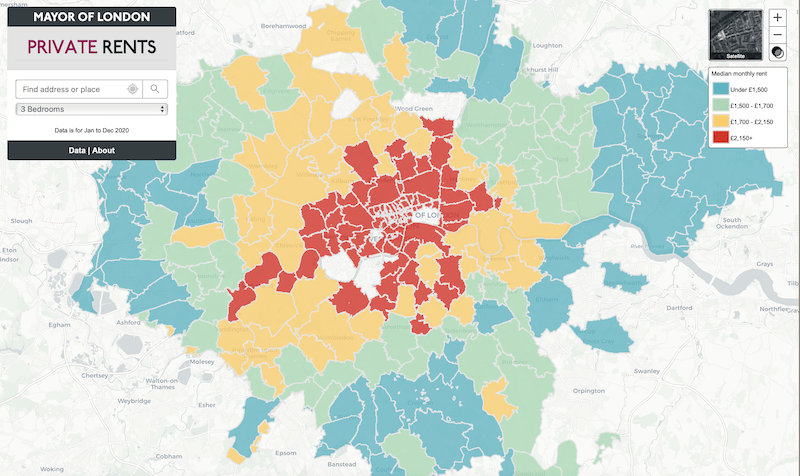
Then check out the Mayor of London’s “London Rents Map” which shows the median private sector rental costs for different sized homes across London, from spare rooms to 4+ bedrooms. It’s updated quarterly, so while it doesn’t reflect short term trends it’s fairly up to date. Again, this will give you a better-yet-general idea of which areas you can afford and what you can expect to spend depending on how central you want to be.
Beyond costs, you’ll also want to research the vibes of each area, what the school situation is if you have children, and of course if you’ll be commuting you’ll want to consider which areas are best connected to where you’ll need to get to vs what you can afford. Use Citymapper to easily find out how much it would cost to commute from a specific area of London you’re considering to live in.
Brush up on your English skills
If English isn’t your first language, that’s ok! But if your English skills aren’t the strongest yet, it can add extra stress to already stressful situations like trying to find housing. I remember when I moved to Italy and my Italian wasn’t very strong yet, and it was NOT fun going flat hunting!
Take the time before you move to London to work on your English as much as possible. I’ve got some friends with English learning Youtube channels that will help, so check out Tom from Eat Sleep Dream English, Aly aka Papa Teach Me, and Lucy from English with Lucy for tons of lessons and practice.
Tom also featured on my channel in a video telling you about some words and phrases to know before coming to London, this is a fab resource even for native English speakers.
Pair down your belongings
The earlier you can start to do this, the less stress you’ll have right before you move to London. My opinion, and many who have moved here from another country would agree, is that you should bring as little as possible with you when you move here. I recommending bringing your clothing and daily-ish living essentials, and then sell or give away everything else.
If your company isn’t going to be paying for your moving costs, shipping your stuff beyond the basics will get VERY expensive VERY quickly. Plus, things like furniture might not fit in the flat you fall in love with (remember they’re very small here) or it might already be furnished. And don’t forget that the plug sockets here are likely different to what your electronics from home take, so anything that isn’t dual voltage won’t work here.
If this process worries you a bit, just know that it actually feels so good to pare down and simplify your life, I promise. Anything you want to hold on to for a return back to your home country you can organise storage for, but again, that monthly cost adds up, so be really brutal about what you keep and what you don’t. You might think you’ll miss it, but you probably won’t… you’ll be too busy having an incredible time in London.
Ship your stuff
If you’ve still got stuff you need to ship over to the UK (as in it can’t fit in as excess baggage when you fly over) then you might need to start shipping it early, as it can take many weeks for it to arrive This does get tricky as you probably don’t have an address yet, so then in that case you might have to ask someone to help with the shipping efforts once you’re settled in the UK.
If you do have someone to help with that, you can apply for Transfer of Residence Relief which gives you some relief on customs charges when sending stuff to your new home. Otherwise, remember that anything you ship from your country will be charged customs and duties fees, which add up VERY quickly and probably aren’t worth whatever you’re shipping.
Ask your bank if you can open a UK account
It’s low chances, but I’ve heard of some worldwide banks like HSBC making it simple to open a UK bank account with them if you’ve already got one in your home country, so do call and enquire about that well in advance.
Otherwise, you can wait until you get to the UK and then open a bank account once you have a UK address, or many foreigners are now opening accounts with digital banks like Starling (what I have for both my personal and business accounts), Monzo and Revolut fairly easily without having a proper address yet.
Important things to do before moving to London: Less than a month out
Now let’s talk about the important things to do before moving to London in less than a month.
Sort out temporary housing for arrival
Say with with me now… I will not commit to a flat, or send anyone money, before I go see it myself. That’s getting ripped off 101, ok? So that means you’ll need to have temporary housing while you do your flat or room search.
If you’re on a budget, consider if you know anyone you can bunk up with for a couple weeks while you’re searching. You could also book a bed at a hostel, sublease a room for a few weeks via SpareRoom, or book into an apart hotel (here’s a list of great ones.)
Some people end up booking airbnbs, however I don’t recommend this because it’s further hurting the housing crisis we have here, which you will feel the pinch of as a soon-to-be Londoner! Here’s my article explaining why we should be avoiding Airbnb in London.
The hunt will likely take you around a month from arrival day until move in day, so look to sort out your accommodation for the first couple of weeks and then extend if you need.
Get a UK SIM for your phone
If you’re working with estate agents for your flat hunt, they usually want to speak on the phone with you before booking in a viewing for you, so you’ll want to have your mobile in working condition ASAP when you arrive in London. You can do this by ordering a SIM to your home country and then you’ll have it as soon as you get off the plane. Try this GiffGaff page as they can get a Pay-As-You-Go SIM sent to you anywhere in the world.
Get your finances sorted
Making sure you have your finances in order for your arrival will make the flat hunting process go more smoothly. Mainly, make sure you have enough cash easily accessible to quickly pay a holding deposit and then a full deposit when you find a property you love. Things move very quickly here so speed is of the essence.
Since you might not have a UK bank account yet, sign up for a service like Wise , which allow you to send money from your home country bank account to an account in the UK very easily. Do this before you go flat hunting as it can take a day or two for set up due to verification times.
Also, when you find a place and put in an application to rent it, you will need documents proving your income. That could be payslips from your current job, bank account statements showing savings, etc. Have those ready to access for when you’re asked for them.
Get your CV in order
If you haven’t got a job yet and you plan to start the job hunt ASAP, take some time to polish up your CV (aka resume) in the UK style. It’s different from other countries so make sure you follow some best practices to make your CV as attractive as possible.
English Jade has a really thorough explanation of the structure of a British CV and what you should and shouldn’t include, so have a watch for some help.
Book flat viewings for your arrival
Two to three days before your arrival, you can start contacting agencies and owners of flats you are seeing listed online and would like to go tour in person.
To start your search, if you’re looking for entire flats, look on websites like Rightmove and Zoopla. You’ll likely be contacted by phone or email by an estate agent and when you are, you can give them all of your info of what you’re looking for so they can let you know about anything they’ve got on their books that’s not even on the market yet.
For rooms in house shares, use SpareRoom and stick with the rooms listed by current or former tenants, not agencies. You can start to contact listing posters a couple of days out from arrival as well.
Another option is to join Facebook groups for the areas you’re looking to rent a flat or a room, and keep checking posting to see if anything fits what you’re looking for. For example, there’s a FB group called Hackney Spaces where people share listings for their empty rooms in Hackney that are ready to rent or sublease. Occasionally there are also postings of people who have entire flats on offer, who are trying to find someone to take over their lease.
Things move quickly in London so only book viewings a couple of days in advance, as if it’s more than a few days away then it’s likely it’ll be taken by the time you go see it. That being said, COVID times have slowed this process down a bit, thankfully!
Understand the transport system
You’ll understand how the London transport system works in no time, but if you want one less thing to worry about, watch some videos to see how it all works. I’ve got a few videos on the Love and London YouTube channel.
Plan journey from the airport/train station to your temporary accommodation
If you’ve got a long journey to London, the last thing you’ll want to do when you’re tired and lugging heavy bags around is to be figuring out how to get to your temporary accommodation. So a day or two before you depart, figure out if you’ll use public transport or get a taxi or car service. One less decision to make!
If you want to use public transport, check Citymapper to see what your options are and their costs.
If you prefer a car, there are two options I frequently use:
- GET – an app that mostly uses classic black taxis. Get the app via my link for discounts on your first rides.
- FreeNow – Similar to Uber, and I like that you can choose fully electric vehicles. Download the app (Apple/Android) and use code mu887she0 for a £4 credit.
Start job hunting
A week or so before you move, you can begin your job search and start making some applications and enquiries. Just be sure to put on your CV that you live in London, otherwise your application will be tossed out.
You could also start reaching out to recruiters that specialise in your industry to submit your CV and have a call before you arrive. BTW… you never need to pay for a recruiter, if one asks for money, then avoid at all costs. To find a recruiter in your field, simply search “INDUSTRY recruiter London” and start contacting.
Get on the plane/train!
The final thing… after months of preparation, leading up to this. And don’t worry… if you’re nervous, its SO normal. I cried the entire plane ride when I moved to Italy and I wasn’t even sure how long I’d be there for!
Read next:
- 8 Unique Souvenirs to Get in London
- 8 Fun Things to Do in London in the Summer
- 15 Unique Museums in London to Explore
Pin this to your Moving to London Pinterest board…
